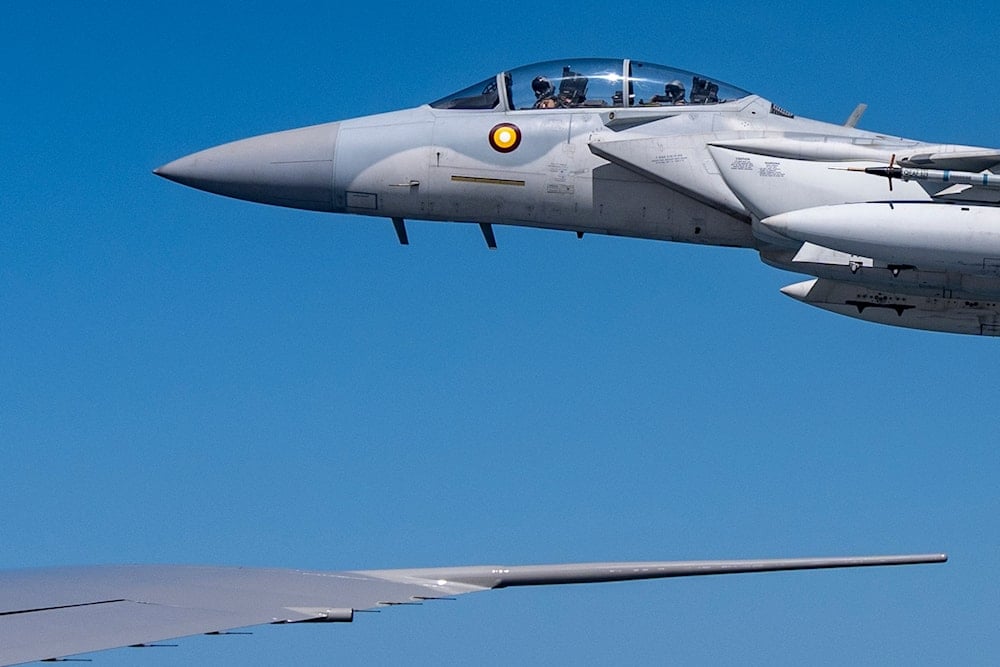US approves Qatar Air Force facility at Idaho base
The US has approved a Qatari Air Force facility at Mountain Home Air Base in Idaho, allowing F-15 fighter jets and personnel to train alongside US forces.
-

A Qatar Emiri Air Force F-15QA provides an honorary escort for Air Force One, carrying President Donald Trump, as it arrives in Doha, Qatar, on May 14, 2025. (AP)
The United States has formally approved the establishment of a Qatari Air Force facility at Mountain Home Air Base in Idaho, allowing Qatar to station F-15 fighter jets and personnel on US soil.
The announcement was made on Friday by US War Secretary Pete Hegseth during a Pentagon briefing alongside Qatari Defense Minister Saoud bin Abdulrahman Al Thani.
“We're signing a letter of acceptance to build a Qatari Emiri Air Force facility at the Mountain Home Air Base in Idaho,” Hegseth said, adding that the site would host Qatari F-15s and pilots to enhance combined training, interoperability, and combat readiness.
US-Qatari strategic partnership
The agreement marks a deepening of defense cooperation between Washington and Doha, following US President Donald Trump’s executive order pledging US protection of Qatar after Israeli air strikes targeted the Qatari capital, Doha. Hegseth highlighted Qatar’s “substantial role” in mediating the recent ceasefire in Gaza, as well as its assistance in securing the release of a US citizen from Afghanistan.
The Qatari minister described the development as a demonstration of a “strong, enduring partnership” and a “deep defense relationship” between the two countries.
Read more: Trump signs order pledging US defense of Qatar after Israeli strike
Mountain Home Air Base and operational control
Mountain Home Air Base, which already hosts a Singaporean fighter squadron, will retain full US control over operations, with Qatari aircraft and personnel integrated into training programs rather than operating independently.
Hegseth clarified that the facility does not constitute a Qatari base, “We control the existing base, like we do with all partners.”
Far-right reactions
The announcement has prompted mixed reactions. While Qatar and the US framed the move as a measure to strengthen regional security, joint training, and interoperability, far-right activist Laura Loomer criticized the plan on social media. Loomer accused the US government of favoring Qatar and the Muslim Brotherhood, questioning the rationale behind allowing a foreign military presence on US soil.
Why are we rewarding Qatar for funding Islamic terrorists who murdered US citizens?
— Laura Loomer (@LauraLoomer) October 10, 2025
What are we even doing?
Why are we importing more Muslims into our country for “training”?
Can anyone tell me a single good thing that has come from importing a single Muslim into our…
In her posts on X, Loomer suggested that the facility could pose security risks, claiming that Qatar had influenced silence among media and political figures. She questioned the decision to train foreign personnel on US soil and framed the arrangement as contrary to “America First” principles. Loomer also made a series of racist and Islamophobic remarks in multiple posts.
There is 100% something controversial about training the funders of Hamas how to fly fighter jets on US soil.
— Laura Loomer (@LauraLoomer) October 10, 2025
It’s un-American and it’s very dangerous.
What happened the last time we let Muslims learn how to fly planes on US soil!?
They are incompatible with our way of life. https://t.co/CVzcnQPLkM
F-15QA deployment, capabilities
Qatar’s presence in Idaho will involve approximately F-15 fighter jets, although the number of aircraft or pilots is yet to be confirmed.
Developed by Boeing, the F-15QA "Ababil" fleet features a fully digital fly-by-wire control system, an AN/APG-82(V)1 AESA radar, and enhanced multirole capabilities, allowing for both air-to-air and air-to-ground operations. Powered by twin F110-GE-129 engines, the F-15QA can reach speeds exceeding Mach 2.5 while sustaining high-G maneuvers.
The aircraft’s combination of advanced avionics, payload capacity, and integrated systems positions Qatar as a formidable air power in the Gulf region. It is worth noting that the QA variant is among the most advanced F-15s ever produced and also features an integrated electronic warfare pod, produced by the Israeli Elbit Systems.
Despite the advanced specs, Qatar's layered air defense systems and fighter fleet were unable to defend against the Israeli attack, which killed one Qatari servicemember. This, alongside the fact that a substantial US military presence in Qatar and the region did not prevent the attack, has prompted Doha to seek further security guarantees from Washington and explore defense options.
Read more: Following 'Israel's' strike on Qatar, could the next target be Turkey?

 4 Min Read
4 Min Read










